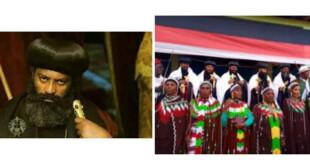Government waging brutal crackdown on peaceful protesters in Oromo, Amnesty International says
A Winnipegger whose nephew was put in prison in the fall says Canada needs to stop funding the Ethiopian government, which is currently at the centre of a violent conflict and civil unrest in the Oromo region.
Activist Addisu Kello, a former Ethiopian refugee, said his nephew was kidnapped from his home on Nov. 27 in Ethiopia. Family members presume he was taken by government officials and put in prison, but they haven’t heard from him since and can’t confirm his whereabouts.
His 27-year-old nephew is one of a growing chorus of voices calling for an end to the Ethiopian government’s planned seizure of land and expansion of the capital city, Addis Ababa.
‘Money that is being sent to Ethiopia is being used in the suppression of the people, including the Oromos.’– Addisu Kello, former Ethiopian refugee
Ethiopians are protesting peacefully in the streets of Oromo, “yet the government is using military and special forces to kill these people,” Kello said. Amnesty International has weighed in and characterized the conflict as a brutal crackdown against peaceful protesters.
In response to those concerns, Kello is organizing a protest at the Manitoba Legislature at noon on Sunday.
For Kello, the scene unfolding in his native land is a harsh reminder of his political past and the 10 years he spent in prison.
10 years in prison
He first served six years in prison in the late ’70s. There are similarities between the ongoing conflicts and those that inspired him and others to rise up in protest against the then-Communist government, Kello said.
“I was in prison in my life two times,” Kello said. “The first one was during the communist era from 1977 to 1982. I was set free — there was no charge.”
Kello was imprisoned again from 1997 to 2001. When he was arrested, about 15 soldiers arrived to take him away, he said.
“They surrounded the house and my two children, they were seven and 11, they were terrorized,” he said. “They put the gun, they aim at us ready to shoot. They searched the house and took everything.”
He was released after political pressure was applied by groups like Human Rights Watch, he said, and made his way to Canada, where other family members had resettled.
The conditions he and many others endured in prison were terrible, Kello said.
“You don’t get enough food. For the first three years, we didn’t have any visits from our family — our families didn’t know we were there,” Kello said. “After three years, they would allow our families to come only on weekends to visit us.”
‘Beating, torture’
Now, Kello worries the tight quarters, limited rights and lack of contact with the outside world are being repeated.
“There was beating, torture,” Kello said. “The first three months they do torture us to get information — who my contacts were, sympathizers of this movement.”
He fears his nephew, who has a wife and two children, is going through the same thing he did behind bars.
Canada is the third-highest donor to the Ethiopian government, Kello said, and he wants Canadians to know how some of those resources are being used.
“We want to make aware to the Canadian people, and government, that the money that is being sent to Ethiopia is being used in the suppression of the people, including the Oromos,” he said. “I think there should be a demand that the Canadian government [stop providing aid to Ethiopia].”
Kello hopes to rally the kind of political support against the Ethiopian government he once received to get them to release his nephew.




